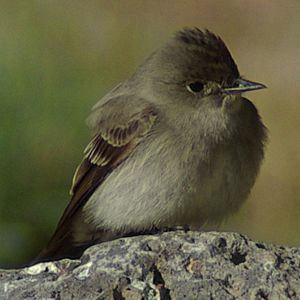Western wood pewee facts for kids
Quick facts for kids Western wood pewee |
|
|---|---|
 |
|
| Conservation status | |
| Scientific classification | |
| Genus: |
Contopus
|
| Species: |
sordidulus
|
 |
|
The western wood pewee (Contopus sordidulus) is a small tyrant flycatcher. These birds are known for their quiet nature. They are gray-olive on their backs and have lighter undersides. Their chest often has an olive color. You can spot two light bars on their wings. Their bill is dark, but the bottom part is yellow near its base.
This bird looks very much like its cousin, the eastern wood pewee. For a long time, people thought they were the same species! The western wood pewee makes a loud, buzzing sound that sounds like "peeer." Its song is a quick series of three "tsee" sounds, ending with a descending "peeer."
Contents
About the Western Wood Pewee
Size and Weight
The western wood pewee is a small bird. Here are some facts about its size:
- Length: It is about 5.5 to 6.3 inches (14 to 16 cm) long.
- Weight: It weighs about 0.4 to 0.5 ounces (11 to 14 grams). That's about as much as a few quarters!
- Wingspan: Its wings can spread out to about 10.2 inches (26 cm).
Where They Live and What They Do
Habitat
Western wood pewees live in open wooded areas. They are found in the western parts of North America. These birds love forests and places with many trees.
Migration
When summer ends, these birds do something amazing. They migrate all the way to South America! They fly thousands of miles to find warmer places for the winter.
Nesting and Reproduction
Female western wood pewees lay two or three eggs. They build their nests in an open cup shape. These nests are often placed on a flat tree branch. Sometimes, they use a hole inside a tree. Forests with California black oak trees are good places for them to build nests. Both the mother and father bird work together to feed their young chicks.
What They Eat
Western wood pewees are insect eaters. They often wait on a branch in the middle of a tree. When they see an insect flying by, they quickly fly out to catch it. This way of hunting is called hawking. Sometimes, they might hover in the air to pick insects right off plants. This is called gleaning.
See also
 In Spanish: Pibí occidental para niños
In Spanish: Pibí occidental para niños


